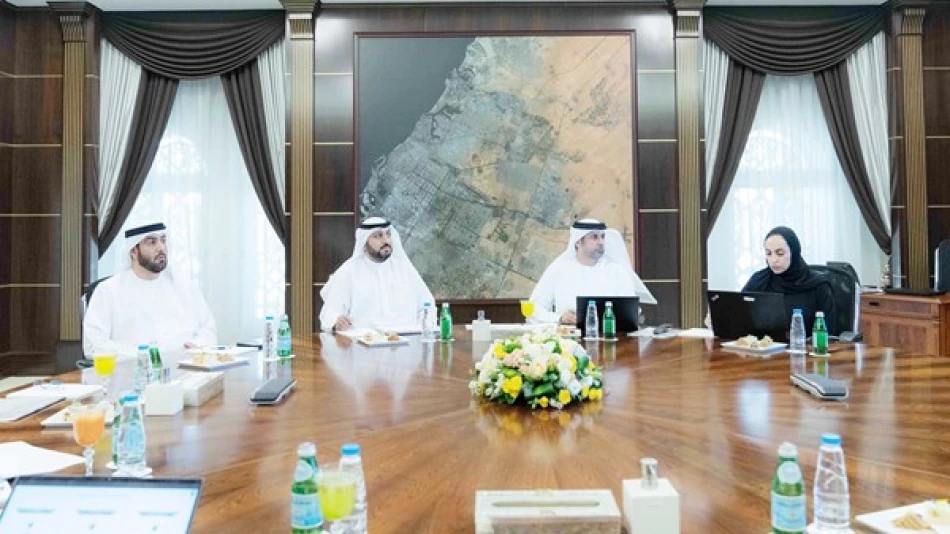
Emirati Competitiveness Council Secretary-General Welcomed by Abdullah bin Salem Al Qasimi
UAE's Ambitious Push to Localize Private Sector Jobs Shows Strong Progress
The UAE's "Nafis" program, designed to place 170,000 Emirati nationals in private sector roles, is gaining significant momentum as senior leadership doubles down on economic diversification efforts. Sheikh Abdullah bin Salem bin Sultan Al Qasimi, Deputy Ruler of Sharjah, recently reviewed the program's achievements during a high-level briefing, highlighting the country's systematic approach to reducing dependence on public sector employment while building a more competitive domestic workforce.
Strategic Vision Behind the Nafis Initiative
The Nafis program represents more than just job placement—it's a cornerstone of the UAE's Vision 2071 strategy to build a knowledge-based economy. During the meeting with Ghannam Buti Al Mazrouei, Secretary-General of the UAE Talent Competitiveness Council, Sheikh Abdullah emphasized the program's role in talent development and private sector integration, areas critical for the country's long-term economic sustainability.
The program's comprehensive approach includes financial support mechanisms, specialized training modules, and targeted initiatives across various economic sectors. This multi-pronged strategy addresses both immediate employment needs and longer-term skills development, positioning Emirati nationals to compete effectively in an increasingly globalized marketplace.
Measurable Impact After Four Years
Quantifiable Success Metrics
The briefing revealed substantial progress over the program's four-year operational period, with notable increases in Emirati participation across private enterprises. The data presented covered employment distribution by age groups, economic sectors, and educational backgrounds, providing a granular view of workforce integration patterns.
Sharjah's specific performance metrics demonstrate the program's localized implementation success, with detailed analysis of job seekers registered on the Nafis platform and participation in specialized tracks including healthcare workforce development and professional mentorship programs.
Sector-Specific Initiatives
The program's sector-focused approach includes targeted initiatives for healthcare professionals, high-potential talent tracks, and career guidance programs. This specialization reflects the UAE's recognition that different industries require tailored approaches to successful workforce localization.
Regional Context and Global Comparisons
The UAE's workforce nationalization efforts mirror similar initiatives across the Gulf region, but with notable distinctions. While Saudi Arabia's Vision 2030 emphasizes Saudization through regulatory mandates, the UAE's approach leans more heavily on incentivization and skills development. This strategy aligns with successful models seen in Singapore and other developed economies that have successfully transitioned from resource-dependent to knowledge-based economies.
The program's emphasis on private sector integration is particularly significant given the traditional preference for government employment among Gulf nationals. By creating attractive pathways into private enterprise, the UAE is addressing a fundamental challenge that has limited economic diversification efforts across the region.
Investment and Market Implications
For international businesses operating in the UAE, the Nafis program signals both opportunity and obligation. Companies that successfully integrate Emirati talent may find themselves better positioned for government contracts and local partnerships, while those that resist localization efforts could face regulatory pressures.
The program's success also has broader implications for the UAE's economic competitiveness. A more skilled and engaged local workforce reduces dependence on expatriate labor while building domestic capacity for innovation and entrepreneurship. This transition is essential for maintaining the UAE's position as a regional business hub as other Gulf states pursue similar diversification strategies.
Looking Ahead: Sustainability and Scale
The 170,000 employment target represents approximately 15% of the UAE's citizen workforce, a substantial shift that requires sustained commitment from both public and private sectors. The program's success will ultimately depend on its ability to create not just jobs, but career pathways that retain talent in private sector roles over the long term.
As the UAE prepares for Expo 2030 and continues positioning itself as a global business destination, programs like Nafis become critical infrastructure investments. The country's ability to demonstrate a skilled, engaged local workforce will influence everything from foreign direct investment decisions to international partnership agreements, making workforce development a key component of national competitiveness strategy.
Most Viewed News

 Layla Al Mansoori
Layla Al Mansoori






